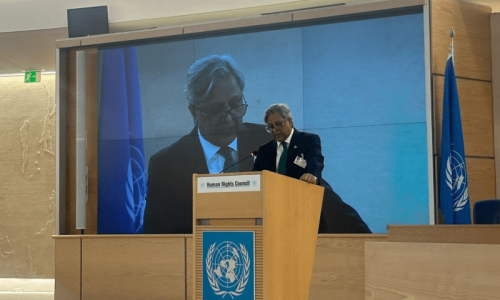WASHINGTON: The US State Department said on Thursday that Prime Minister Imran Khan’s claims of a US involvement in the no-trust move against his government were just allegations without any truth.
In what appeared to be a slip of tongue, the prime minister during his address to the nation, named the United States as the country that was allegedly behind the letter, but then quickly corrected himself, saying that it was another country and not America.
When Dawn contacted the State Department for comment on the prime minister’s statement, one of their spokespersons: said “There is no truth to these allegations.”
This is an unusually blunt comment on a statement by a head of government, but is indicative of the growing frustration in Washington with the allegations coming out of Islamabad recently.
The department, however, did not respond to the question of what impact such allegations could have on US-Pakistan relations and their contacts with Pakistan’s diplomatic missions in the US.
Diplomatic observers in Washington say that this could have a negative impact on bilateral relations and could make US officials more careful in interacting with Pakistani officials.
They explained that embassies and officials of the host nations often use informal meetings to convey “thoughts and feelings” that cannot be sent through proper diplomatic channels.
“Embassies are like listening posts. They hear many things and share those with their government for them to read and analyse,” said one such observer. “But if you make officials of the host nation feel embarrassed, they will not talk to you and your embassy will no longer be a listening post.”
Michael Kugelman, a scholar of South Asian affairs at the Wilson Center, Washington, noted that “over the history of US-Pakistan relations, it’s been quite common for officials on both sides, in private conversations, to vent and share personal and negative assessments on current developments.”
But it’s “a stretch to liken this to a threat, much less an indication of regime change,” he added.
Pakistani journalist Nasim Zehra, while responding to Mr Kugelman’s comments on the social media, said that a US undersecretary of state did call the outgoing Pakistani ambassador Asad Majeed Khan to “deliver a demarche” for Islamabad and told him that “as long as Mr. Khan is the PM, relations with Pakistan cannot improve and if he goes Pakistan can be forgiven for its mistakes.”
She described this as an “outrageous official communication” that “all must condemn.”
Mr Kugelman said that someone other than an undersecretary would have made this comment, perhaps an assistant secretary, who’d be more likely to speak to the ambassador. Perhaps part of a farewell call to the ambassador before his departure for his new posting.”
Published in Dawn, April 1st, 2022













































